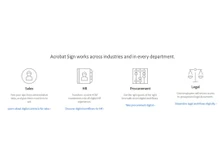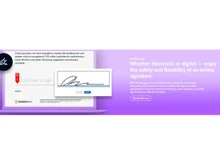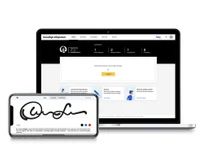To ease mergers, partnerships, or regular business contracts, eSignature solutions are something that businesses are switching to. Although the software ensures ease in validating and authenticating documents, it might put your confidential business information at risk.
Here, a secure and reliable document signing solution like Adobe Sign or DocuSign can give you some relief. We have brough to you a fair comparison of Adobe Sign vs DocuSign that will help you decide which is better for your business.
Adobe Sign vs DocuSign: Overview
So, choosing one might be a difficult task for users. However, some comparisons might help you make the decision.
For instance, DocuSign comes with advanced analytics features and more integration options than Adobe Sign. DocuSign’s advanced features include locked templates, phone biometric authentication, etc. On the other hand, Adobe Sign is more suitable for individual users as it offers affordable pricing plans.
However, this difference might not be enough, so we have done a detailed comparison of Adobe Sign and DocuSign on other parameters that include:
- Features
- User-Friendly Experience
- Customization
- Identification & Authentication
- Security & Compliance
- Integrations & API
- Support & Resource Material
- Platform & Device Compatibility
- Pricing & Plans
Adobe Sign vs DocuSign: Features Comparison
After comparing Adobe Sign and DocuSign, we found that majorly they offer similar functionalities. These include legally bonded eSignatures, bulk document sharing, and signing, real-time audit trail, and digital forms. However, DocuSign is superior to Adobe Sign as it offers locked templates and analytics.
Let’s understand in detail how the features work in both the eSignature solutions, Adobe Sign and DocuSign work.
- Legally Binding eSignature: Both the platforms support legally binding eSignatures which means that the digital signatures hold equivalent value as to the wet signatures.
- Bulk Actions: Adobe Sign and DocuSign help you save time and automate your signing process. You can easily share digital documents with multiple users in bulk by just importing a list of recipients. In fact, it also facilitates bulk signing so that you can sign documents at a scale.
- Notifications & Reminders: Both eSignature solutions allow users to send automated reminders through email to speed up the document signing process. Moreover, you can also set up notifications for upcoming events to ensure that your documents are signed on time. In fact, you can also set expiration dates for document signing.
- Audit Trail: This is another feature of Acrobat Sign and DocuSign that allows users to track which parties or signers have signed the document. You can also track when, where, and who signed the document in real-time along with time stamps. So, you no longer need to waste time in chasing people to sign a document.
- Templates: Both these eSigning platforms offer basic template functionalities where you can create and even share reusable templates for frequently used types of agreements. However, DocuSign is a little superior to Adobe Sign in terms of templates, as it also offers the functionality of locked templates. This allows you to gain more control over your templates which limits the changes that any other recipient can make to branding or messages. Further, this ensures that unauthorized users cannot make any changes to the contract or the document.
- Reports & Analytics: DocuSign offers more advanced analytics features that are missing in Adobe Sign and other available DocuSign alternatives. The former offers you greater visibility into the document validation status so that you can make data driven decisions.
- Forms: With both Adobe Sign and DocuSign, users can easily create and publish digital forms. Users no longer need to send physical forms to get signatures, they can easily share digital forms to get instant digital signatures. Moreover, you can also incorporate drop downs, approval buttons, radio buttons, clickable links, and more in the forms for a positive signing experience.
Adobe Sign vs DocuSign: User-Friendly Experience
As the functional level, both Adobe Sign and DocuSign work quite similarly. Both the eSignature tools support drag & drop functionality that help users quickly add digital signatures to a document or contract. Moreover, both platforms allow you to upload and create documents with ease.
Additionally, Adobe Sign and DocuSign also guide their users through the complete eSignature uses, making it user friendly for first-timers as well.
Adobe Sign vs DocuSign: Customization
Both Adobe Sign and DocuSign are at par when it comes to offering customization options. These eSignature solutions allow users to customize branding elements in terms of logos, colors, fields, tables, and other buttons on the document.
In addition to this, you can also add custom messages and taglines to create a brand profile and then use it as a default brand setting. Some other advanced customization options include setting up footers, headers, and even URLs. However, none of the document signing solutions offer white labeling services to businesses.
Adobe Sign vs DocuSign: Identification & Authentication
Both the document signing solutions offer two- step authentications process that help you identify and validate your signers. Additionally, both products offer an audit trail which makes your eSignatures traceable.
Moreover, DocuSign comes with one more additional authentication method that is done via phone biometric for added layer of security.
Adobe Sign vs DocuSign: Security & Compliance
DocuSign is a more secure document signing solution than Adobe Sign.
With Adobe Sign, you can protect your documents with passwords, get a security certification, and authenticate your signers using two factor authentication. On the other hand, DocuSign offers similar security features along with the digital audit trail and GDPR, ISO 27001, and eIDA compliance.
Moreover, DocuSign is also more transparent regarding its security protocols and procedures on its official website. Whereas Adobe Sign doesn’t talk much about its security and compliance policies on the website.
Adobe Sign vs DocuSign: Integrations & API
DocuSign offers more integration and API options than Adobe Sign.
In DocuSign, you get integration with cloud storage platforms like OneDrive, Google Drive, and Dropbox, etc. You can also integrate this document signing solution with platforms like Microsoft 365, Google Workspace, Slack, Zoom, Microsoft Teams, etc., to increase your productivity and collaboration. All these integrations are available across all their plans.
On the other hand, Adobe Sign offers integration with only Microsoft 365 and Box in its individual plans. Moreover, there are no integrations available in both the Teams’ plan. Only in the customized plan, users get integration with Salesforce and ServiceNow, API access, and additional pre-built integrations.
Adobe Sign vs DocuSign: Support & Resource Material
Although both Adobe Sign and DocuSign offer 24*7 customer support, still, DocuSign’s customer service is better than Adobe Sign. This is because of DocuSign’s one-hour emergency response that provides their users with quicker customer service than Adobe Sign.
However, both eSignature solutions offer equal amount of supportive material like video tutorials, community support, articles, knowledge center, and more.
Adobe Sign vs DocuSign: Platform & Device Compatibility
These eSignature solutions can be easily accessed on Windows and Mac devices, like all major DocuSign and Adobe Sign alternatives. They also offer mobile apps for Android and iOS devices, so that you can easily view, sign, and share documents even on the go.
However, as per the rating, DocuSign app ensures a more user-friendly experience compared to Adobe Acrobat Sign. Users can easily zoom in and out on documents and even modify them directly through the app.
Adobe Acrobat Sign Android App – 3/5
Adobe Acrobat Sign iOS App – 2.5/5
DocuSign Android App – 4.4/5
DocuSign iOS App – 4.9/5
Adobe Sign vs DocuSign: Pricing & Plans
Neither of these document signing solutions have any free plan. However, DocuSign does offer a longer free trial plan of 30 days than Adobe Sign, which offers only 7 days trial.
In fact, DocuSign is also more affordable compare to Adobe Sign, as its paid plans for individuals start from ₹1226.33 per month and Adobe Sign plans begin from ₹1834.90 per month. But, for teams, Adobe Sign is cheaper than DocuSign. Adobe’s plans for teams start from ₹1196.52 per month, per license, whereas DocuSign’s teams plans start from ₹3678.95 per month, per seat. In addition to this, DocuSign also comes with a NAR member exclusive Realtors plan which starts at ₹2861.41 per month, per seat.
However, Adobe Sign offers more pricing plan options for individuals and solopreneurs to choose from as compared to DocuSign.
Adobe Sign vs DocuSign: Which is Better?
If you are looking for basic eSignature functionalities, you can go ahead with either of the solutions, Adobe Sign or DocuSign. Both are compatible across all devices, offer 24*7 customer support, Microsoft 365 integration, and two-step authentication.
However, if you are searching for a more advanced document signing solution, DocuSign must be your choice. DocuSign is better than Adobe Sign in terms of offering more integration options, user- friendly mobile experience, phone biometric authentication, and more.


 12 Ratings & 12 Reviews
12 Ratings & 12 Reviews

















